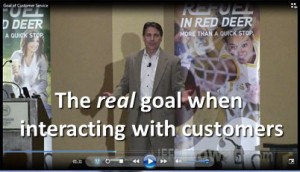When it comes to customer service strategies, Jeff didn't just read the book - he wrote it! He's the author of the best-selling business books, Becoming a Service Icon in 90 Minutes a Month and Influence with Ease. He is a Hall of Fame motivational speaker and has produced several training tools. His Influence with Ease® column has been syndicated and featured in over 200 business and on-line publications.
How to be remembered more positively
Chances are your customers and co-workers don't really want to interact with you. Yes, they want the benefits of your service, but the actual process of interacting with you is often just a means to that end. That's why, if all you do is focus on the customer or coworker request itself, your service will be quickly forgotten by customers and marginalized by co-workers. They may remember the transaction but they'll forget you. Fortunately, you can rise above the noise of transactions by using empathy and explaining that you understand their CONTEXT; what they're really looking to achieve. Maybe it means stating to a coworker that you'll send the information right away; so they can take care of those external customers who pay everyone's wages. Perhaps it's explaining to a project manager your goal is to help keep the project on time, within budget and without foul-ups. People remember professionals who get them
Two Words to Keep you Out of the Doghouse
 You’ve not doubt noticed that when customers, co-workers, or even family members are frustrated, a single misspoken word can put them over the edge. Check-out this short video clip where we had fun with a group of managers where I share key words for them to pass on to their teams – and also use at home – when things go wrong.
You’ve not doubt noticed that when customers, co-workers, or even family members are frustrated, a single misspoken word can put them over the edge. Check-out this short video clip where we had fun with a group of managers where I share key words for them to pass on to their teams – and also use at home – when things go wrong.
How to Stand-out without Shouting
 In my seminars I often talk about today’s customers being so busy and distracted (frequently by their mobile phones) that they don’t notice when service is merely good. So, you can provide consistent service all day long and customers and co-workers will not only not reward you; they don’t even notice you. Worse, the only time some customers do notice is when there’s a problem. Which is why is seems like some days all you hear from are unhappy people. That’s why it’s important to help others take notice when you provide great service. Here’s one of several unobtrusive ways… When you are contacting a customer or coworker to report on their project or shipment, start the conversation by letting them know you’re giving them a courtesy update. Those two words make you stand-out because you’re positioning your update as a courtesy.
In my seminars I often talk about today’s customers being so busy and distracted (frequently by their mobile phones) that they don’t notice when service is merely good. So, you can provide consistent service all day long and customers and co-workers will not only not reward you; they don’t even notice you. Worse, the only time some customers do notice is when there’s a problem. Which is why is seems like some days all you hear from are unhappy people. That’s why it’s important to help others take notice when you provide great service. Here’s one of several unobtrusive ways… When you are contacting a customer or coworker to report on their project or shipment, start the conversation by letting them know you’re giving them a courtesy update. Those two words make you stand-out because you’re positioning your update as a courtesy.
The real goal when interacting with customers
What do you suppose our goal should be when interacting with customers and co-workers: Have them like us? Make the sale? Process the transaction?Provide information? Perhaps all of these apply. However, there is a single fundamental objective, which - when you keep in the forefront of your mind – will ultimately generate better results for you and the other person. Discover the secret in this short video.
I Don’t seem to fit-in at work
 Occasionally when I’m interviewing a client’s employees in preparation for a seminar, someone will confide that while they enjoy dealing with external customers, the real stress is dealing with their internal customers; their co-workers. With the various friendships and cliques that naturally spring-up in the workplace, some employees may have a hard time fitting-in. Ironically, trying to fit-in is the last thing they should do. If you or a colleague have ever felt like you just aren’t connecting with the people you work with, here are 5 tips for building better workplace relationships...
Occasionally when I’m interviewing a client’s employees in preparation for a seminar, someone will confide that while they enjoy dealing with external customers, the real stress is dealing with their internal customers; their co-workers. With the various friendships and cliques that naturally spring-up in the workplace, some employees may have a hard time fitting-in. Ironically, trying to fit-in is the last thing they should do. If you or a colleague have ever felt like you just aren’t connecting with the people you work with, here are 5 tips for building better workplace relationships...
To read the complete article click: I Don't Fit-in at Work
Smile through your Eyes
 Smile through your eyes was a term I heard from a hotel manager who was describing how he wanted his staff to connect with customers more warmly. Certainly it’s a less sarcastic way of telling employees the old one-liner, “If you’re happy, tell your face.” The reality is in today’s rushed workplace we may not always be in the best mood. But that’s no excuse to treat internal and external customers (or anyone) with coolness. Sometimes you do need to remind yourself to smile. Just remember - so that it doesn’t look forced - to smile through your eyes.
Smile through your eyes was a term I heard from a hotel manager who was describing how he wanted his staff to connect with customers more warmly. Certainly it’s a less sarcastic way of telling employees the old one-liner, “If you’re happy, tell your face.” The reality is in today’s rushed workplace we may not always be in the best mood. But that’s no excuse to treat internal and external customers (or anyone) with coolness. Sometimes you do need to remind yourself to smile. Just remember - so that it doesn’t look forced - to smile through your eyes.
Setting Customer Expectations
 When I talk with managers and their teams about enhancing customer relationships, we`ll occasionally discover problems caused by the absence of a single communication piece. Employees may meet with the customer several times to propose a potential project. Once the customer agrees to go-ahead though, those same employees don’t spend enough time clarifying expectations. For example, during a project if you need customers to put any change-orders to the contract in writing (rather than verbally), then it should be agreed-upon in advance. I`m not talking about the main legal contract that only lawyers can understand. I mean before the work begins, walking a customer through a separate one-page plain-English document that spells out service expectations; complete with spaces for both parties to initial. Better to manage expectations up-front than be forced to do damage-control later on.
When I talk with managers and their teams about enhancing customer relationships, we`ll occasionally discover problems caused by the absence of a single communication piece. Employees may meet with the customer several times to propose a potential project. Once the customer agrees to go-ahead though, those same employees don’t spend enough time clarifying expectations. For example, during a project if you need customers to put any change-orders to the contract in writing (rather than verbally), then it should be agreed-upon in advance. I`m not talking about the main legal contract that only lawyers can understand. I mean before the work begins, walking a customer through a separate one-page plain-English document that spells out service expectations; complete with spaces for both parties to initial. Better to manage expectations up-front than be forced to do damage-control later on.
Bad Day? Try this…
 Ever have days where being nice to internal and external customers isn’t easy? Maybe it’s when everything that can go wrong - does. Or perhaps it’s when you have stuff happening at home. Or you’re simply not feeling ‘up’. Remember the hit song, “You had a bad day”? I think it was popular because it encouraged people to focus on themselves – their feelings - enabling them to present the excuse, “I’m having a bad day.” While I understand that there are indeed major setbacks in life, for the most part, the ‘bad day’ excuse is bunk. Maybe we have bad moments, but to have the minor glitches of daily living give license to be less than positive and professional around customers and coworkers? Ironically, one of the best ways to lift our spirits is to stop focusing on ourselves, and instead focus on helping others.
Ever have days where being nice to internal and external customers isn’t easy? Maybe it’s when everything that can go wrong - does. Or perhaps it’s when you have stuff happening at home. Or you’re simply not feeling ‘up’. Remember the hit song, “You had a bad day”? I think it was popular because it encouraged people to focus on themselves – their feelings - enabling them to present the excuse, “I’m having a bad day.” While I understand that there are indeed major setbacks in life, for the most part, the ‘bad day’ excuse is bunk. Maybe we have bad moments, but to have the minor glitches of daily living give license to be less than positive and professional around customers and coworkers? Ironically, one of the best ways to lift our spirits is to stop focusing on ourselves, and instead focus on helping others.
Make a stronger first impression in under 3 seconds
 You've no doubt noticed that today's workplace is more casual; not only in the way we dress, but in they way we speak. I believe we've gone too far. Specifically, I'm referring to when you're face to face with customers or colleagues and you introduce yourself by first name only; "Hi, I'm Jeff." If you don't provide your last name, it implies you don't think you're important. And since there may be more than one person in your organization with your first name, it also implies you are hiding and don't like to be held accountable. Remember, your goal is not to become your customers' and co-workers' buddy. Your goal is to be considered a trusted advisor. Fortunately, you can prevent all these negative perceptions in under 3 seconds. Simply get in the habit of introducing yourself using your first and last names.
You've no doubt noticed that today's workplace is more casual; not only in the way we dress, but in they way we speak. I believe we've gone too far. Specifically, I'm referring to when you're face to face with customers or colleagues and you introduce yourself by first name only; "Hi, I'm Jeff." If you don't provide your last name, it implies you don't think you're important. And since there may be more than one person in your organization with your first name, it also implies you are hiding and don't like to be held accountable. Remember, your goal is not to become your customers' and co-workers' buddy. Your goal is to be considered a trusted advisor. Fortunately, you can prevent all these negative perceptions in under 3 seconds. Simply get in the habit of introducing yourself using your first and last names.
How to get your customers attention
 Common sense tells us that customers and co-workers won't be receptive to you when they feel rushed or distracted. That means if your timing is off, people will resist your input. That's why at the beginning of your interaction it's important to get them to commit to being fully present. Start the conversation by asking customers about their timing. As I share in my seminars though, you need to be careful how you word your question. Avoid asking a negative question, "Are you in a hurry?" A negative question sets a negative tone. Similarly, avoid asking a naive question like, "Are you busy?" Everyone's busy. A better way of getting the customer's attention is to simply ask, "How's your time - are we OK?" The wording is positive. And it's asking more than just about time; but how they are overall in terms of being receptive.
Common sense tells us that customers and co-workers won't be receptive to you when they feel rushed or distracted. That means if your timing is off, people will resist your input. That's why at the beginning of your interaction it's important to get them to commit to being fully present. Start the conversation by asking customers about their timing. As I share in my seminars though, you need to be careful how you word your question. Avoid asking a negative question, "Are you in a hurry?" A negative question sets a negative tone. Similarly, avoid asking a naive question like, "Are you busy?" Everyone's busy. A better way of getting the customer's attention is to simply ask, "How's your time - are we OK?" The wording is positive. And it's asking more than just about time; but how they are overall in terms of being receptive.


